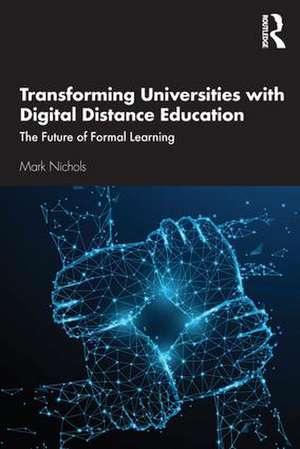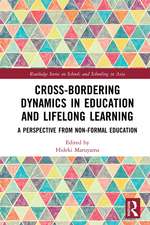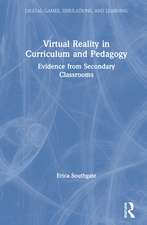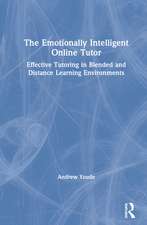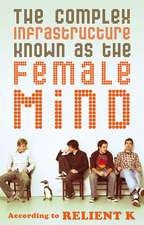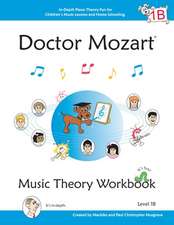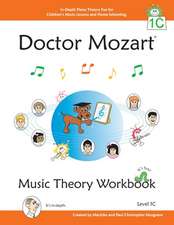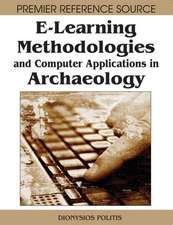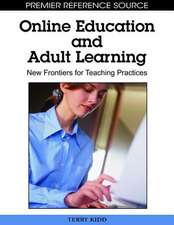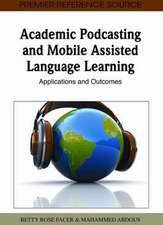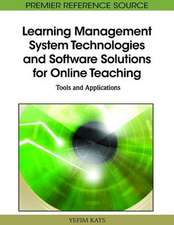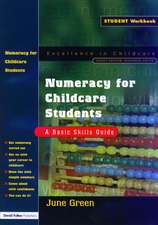Transforming Universities with Digital Distance Education: The Future of Formal Learning
Autor Mark Nicholsen Limba Engleză Paperback – 14 mai 2020
| Toate formatele și edițiile | Preț | Express |
|---|---|---|
| Paperback (1) | 328.06 lei 43-57 zile | |
| Taylor & Francis – 14 mai 2020 | 328.06 lei 43-57 zile | |
| Hardback (1) | 762.97 lei 43-57 zile | |
| Taylor & Francis – 12 mai 2020 | 762.97 lei 43-57 zile |
Preț: 328.06 lei
Nou
Puncte Express: 492
Preț estimativ în valută:
62.78€ • 65.71$ • 52.25£
62.78€ • 65.71$ • 52.25£
Carte tipărită la comandă
Livrare economică 31 martie-14 aprilie
Preluare comenzi: 021 569.72.76
Specificații
ISBN-13: 9781138614703
ISBN-10: 113861470X
Pagini: 188
Ilustrații: 19 Tables, black and white; 14 Line drawings, black and white; 5 Halftones, black and white; 19 Illustrations, black and white
Dimensiuni: 152 x 229 x 22 mm
Greutate: 0.26 kg
Ediția:1
Editura: Taylor & Francis
Colecția Routledge
Locul publicării:Oxford, United Kingdom
ISBN-10: 113861470X
Pagini: 188
Ilustrații: 19 Tables, black and white; 14 Line drawings, black and white; 5 Halftones, black and white; 19 Illustrations, black and white
Dimensiuni: 152 x 229 x 22 mm
Greutate: 0.26 kg
Ediția:1
Editura: Taylor & Francis
Colecția Routledge
Locul publicării:Oxford, United Kingdom
Public țintă
Academic, Professional, and Professional Practice & DevelopmentCuprins
1. Introduction 2. On learning and formal education 3. Models of university education 4. The digital distance education (DDE) model 5. Module narratives 6. Teaching roles 7. Module development: context, direction, and practice 8. Operating models and organisational change
Notă biografică
Mark Nichols is Executive Director of Learning Design & Development at The Open Polytechnic of New Zealand. Before returning to Open Polytechnic, he was previously Director of Technology Enhanced Learning at The Open University, UK.
Recenzii
"One of the most revolutionary ideas about education to emerge in the 20th century was the application of systems methods to teaching as well as resource management, most notably in the open universities. In response, traditional universities have focused attention on the adoption of revolutionary technologies while deflecting attention from structural and pedagogical reform. Mark Nichols has added his voice to the (short) list of those in higher education who have acknowledged the dysfunctionality of the traditional university. In a very personal and sometimes passionate argument, he lays out his vision of a systems approach to higher education. As a long-time advocate of the systems approach in distance education, I am delighted to welcome this fresh, expansive elaboration of both the imperative for reform in higher education and the systems approach as the only viable solution." —Michael G. Moore, Distinguished Professor Emeritus of Education at The Pennsylvania State University, USA; Editor of the American Journal of Distance Education; and co-author of Distance Education: A Systems View of Online Learning
"Mark Nichols’ book offers a very significant reflection on higher education in a digital age. His discussion of how digital technologies might transform higher education and, within that, distance higher education in positive and progressive ways brings together a wide range of ideas and a genuinely new synthesis. One of the many strengths of the book is that it avoids being trapped either by being technology-led or by assuming that campus and online modes have nothing to do with each other. On the contrary, this volume could valuably be read by colleagues working in campus, blended, and distance modes." —Alan Tait, Professor Emeritus of Distance Education and Development at The Open University, United Kingdom
"This book provides an excellent, no-holds-barred discourse on developing digital distance education based on the author’s experience working in a range of online higher education institutions around the world. It carefully deconstructs the current on-campus, lecture-based offerings and the challenges of delivering at scale, especially in light of challenges in resourcing and increasing student expectation. It goes on to thoroughly outline the various components needed to create an effective online student learning experience based on engaging, enlightening, and empowering students rather than just providing content. More importantly, it acknowledges the challenges of personalisation of learning at scale. The book is thoughtfully designed to take the reader on a journey of discovery of digital education with activities that ask readers to reflect on their experiences and where they are in this journey. I would recommend this book to anyone involved in the digital transformation of higher education." —Peter Taylor, Emeritus Professor in Organic Chemistry at The Open University, United Kingdom
"One of the most revolutionary ideas about education to emerge in the 20th century was the application of systems methods to teaching as well as resource management, most notably in the open universities. In response, traditional universities have focused attention on the adoption of revolutionary technologies while deflecting attention from structural and pedagogical reform. Mark Nichols has added his voice to the (short) list of those in higher education who have acknowledged the dysfunctionality of the traditional university. In a very personal and sometimes passionate argument, he lays out his vision of a systems approach to higher education. As a long-time advocate of the systems approach in distance education, I am delighted to welcome this fresh, expansive elaboration of both the imperative for reform in higher education and the systems approach as the only viable solution."
—Michael G. Moore, Distinguished Professor Emeritus of Education at The Pennsylvania State University, USA; Editor of the American Journal of Distance Education; and co-author of Distance Education: A Systems View of Online Learning
"Mark Nichols’ book offers a very significant reflection on higher education in a digital age. His discussion of how digital technologies might transform higher education and, within that, distance higher education in positive and progressive ways brings together a wide range of ideas and a genuinely new synthesis. One of the many strengths of the book is that it avoids being trapped either by being technology-led or by assuming that campus and online modes have nothing to do with each other. On the contrary, this volume could valuably be read by colleagues working in campus, blended, and distance modes."
—Alan Tait, Professor Emeritus of Distance Education and Development at The Open University, United Kingdom
"This book provides an excellent, no-holds-barred discourse on developing digital distance education based on the author’s experience working in a range of online higher education institutions around the world. It carefully deconstructs the current on-campus, lecture-based offerings and the challenges of delivering at scale, especially in light of challenges in resourcing and increasing student expectation. It goes on to thoroughly outline the various components needed to create an effective online student learning experience based on engaging, enlightening, and empowering students rather than just providing content. More importantly, it acknowledges the challenges of personalisation of learning at scale. The book is thoughtfully designed to take the reader on a journey of discovery of digital education with activities that ask readers to reflect on their experiences and where they are in this journey. I would recommend this book to anyone involved in the digital transformation of higher education."
—Peter Taylor, Emeritus Professor in Organic Chemistry at The Open University, United Kingdom
"Nichols (Open Polytechnic of New Zealand) proposes a model of online distance learning to make education more accessible, scalable, and personalized. Given that society expects students to be engaged, enlightened, and empowered by their investment in education, he advocates for a transformation of how universities operate using the SAMR (Substitution, Augmentation, Modification, Replacement) model for digital education. Nichols contrasts the four current models of university education with a digital distance education (DDE) university that would be "nonsemesterised," flexible, scalable, and would feature distance course learning activities.
The text is structured so that each chapter concludes with suggested activities and reflection questions, and includes an "Am I Ready for Distance Learning" survey.
—D. L. Stoloff, Eastern Connecticut State University, Choice
"Mark Nichols’ book offers a very significant reflection on higher education in a digital age. His discussion of how digital technologies might transform higher education and, within that, distance higher education in positive and progressive ways brings together a wide range of ideas and a genuinely new synthesis. One of the many strengths of the book is that it avoids being trapped either by being technology-led or by assuming that campus and online modes have nothing to do with each other. On the contrary, this volume could valuably be read by colleagues working in campus, blended, and distance modes." —Alan Tait, Professor Emeritus of Distance Education and Development at The Open University, United Kingdom
"This book provides an excellent, no-holds-barred discourse on developing digital distance education based on the author’s experience working in a range of online higher education institutions around the world. It carefully deconstructs the current on-campus, lecture-based offerings and the challenges of delivering at scale, especially in light of challenges in resourcing and increasing student expectation. It goes on to thoroughly outline the various components needed to create an effective online student learning experience based on engaging, enlightening, and empowering students rather than just providing content. More importantly, it acknowledges the challenges of personalisation of learning at scale. The book is thoughtfully designed to take the reader on a journey of discovery of digital education with activities that ask readers to reflect on their experiences and where they are in this journey. I would recommend this book to anyone involved in the digital transformation of higher education." —Peter Taylor, Emeritus Professor in Organic Chemistry at The Open University, United Kingdom
"One of the most revolutionary ideas about education to emerge in the 20th century was the application of systems methods to teaching as well as resource management, most notably in the open universities. In response, traditional universities have focused attention on the adoption of revolutionary technologies while deflecting attention from structural and pedagogical reform. Mark Nichols has added his voice to the (short) list of those in higher education who have acknowledged the dysfunctionality of the traditional university. In a very personal and sometimes passionate argument, he lays out his vision of a systems approach to higher education. As a long-time advocate of the systems approach in distance education, I am delighted to welcome this fresh, expansive elaboration of both the imperative for reform in higher education and the systems approach as the only viable solution."
—Michael G. Moore, Distinguished Professor Emeritus of Education at The Pennsylvania State University, USA; Editor of the American Journal of Distance Education; and co-author of Distance Education: A Systems View of Online Learning
"Mark Nichols’ book offers a very significant reflection on higher education in a digital age. His discussion of how digital technologies might transform higher education and, within that, distance higher education in positive and progressive ways brings together a wide range of ideas and a genuinely new synthesis. One of the many strengths of the book is that it avoids being trapped either by being technology-led or by assuming that campus and online modes have nothing to do with each other. On the contrary, this volume could valuably be read by colleagues working in campus, blended, and distance modes."
—Alan Tait, Professor Emeritus of Distance Education and Development at The Open University, United Kingdom
"This book provides an excellent, no-holds-barred discourse on developing digital distance education based on the author’s experience working in a range of online higher education institutions around the world. It carefully deconstructs the current on-campus, lecture-based offerings and the challenges of delivering at scale, especially in light of challenges in resourcing and increasing student expectation. It goes on to thoroughly outline the various components needed to create an effective online student learning experience based on engaging, enlightening, and empowering students rather than just providing content. More importantly, it acknowledges the challenges of personalisation of learning at scale. The book is thoughtfully designed to take the reader on a journey of discovery of digital education with activities that ask readers to reflect on their experiences and where they are in this journey. I would recommend this book to anyone involved in the digital transformation of higher education."
—Peter Taylor, Emeritus Professor in Organic Chemistry at The Open University, United Kingdom
"Nichols (Open Polytechnic of New Zealand) proposes a model of online distance learning to make education more accessible, scalable, and personalized. Given that society expects students to be engaged, enlightened, and empowered by their investment in education, he advocates for a transformation of how universities operate using the SAMR (Substitution, Augmentation, Modification, Replacement) model for digital education. Nichols contrasts the four current models of university education with a digital distance education (DDE) university that would be "nonsemesterised," flexible, scalable, and would feature distance course learning activities.
The text is structured so that each chapter concludes with suggested activities and reflection questions, and includes an "Am I Ready for Distance Learning" survey.
—D. L. Stoloff, Eastern Connecticut State University, Choice
Descriere
1. Introduction 2. On learning and formal education 3. Models of university education 4. The digital distance education (DDE) model 5. Module narratives 6. Teaching roles 7. Module development: context, direction, and practice 8. Operating models and organisational change
